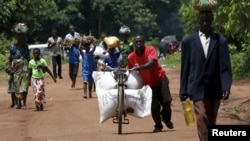The United States is continuing to provide food assistance to its partner Malawi. U.S. Ambassador to Malawi Virginia Palmer recently announced a new U.S. donation of $4.6 million [Malawian Kwacha 3.3 billion] to assist Malawian people in need of humanitarian food assistance.
This additional donation is in response to the Malawi Vulnerability Assessment Committee’s report that 6.7 million Malawians need imminent food assistance to alleviate suffering. Funds will be channeled through the UN World Food Program.
Ambassador Palmer said she appreciated “President [Peter] Mutharika’s leadership in dealing with the worst food crisis of the Southern Africa drought.” She also praised Vice President Saulos Chilima’s months-long work to bring all stakeholders to the table to address Malawi’s food crisis.
Of the $4.6 million, $2.5 million will be used to transport and distribute 10,800 metric tons of maize from the Malawian Government’s Strategic Grain Reserve, and $2.1 million is education funding repurposed to fill a critical gap in Malawi’s school feeding program.
This additional assistance brings the United States Government’s total contribution to the 2016-2017 Food Insecurity Response Plan to $126 million, equivalent to about one third of the Plan’s $395 million estimated cost.
Ambassador Palmer pledged that the United States will continue to work with the Government of Malawi to break the cycle of food insecurity. Key to this is Malawi’s fulfilling its New Alliance for Food Security and Nutrition commitments.
These include a review of the Control of Goods Act, which has inhibited investment in food production, and passage of a Seed Bill consistent with Malawi’s commitment to SADC seed harmonization so Malawi’s farmers can access and sell quality seeds across the region. Reforms are urgently required to help avoid future food shortages caused not only by climate change but by the unpredictability of Malawi’s maize markets.
“The United States Government continues to stand by Malawians in their time of need,” said Ambassador Palmer. “But, together we recognize that policy and market predictability are critical if Malawi’s farmers are to become entrepreneurs, if agribusinesses are to invest, and if Malawi is to transform its agriculture sector from a source of vulnerability into an engine for growth.”














